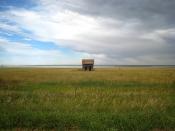As many Europeans settled in North America, their settlements were quite spread out, roads were often poor and people were extremely isolated. Since America lacked long-settled cities, universities, formal medical training and hospitals were essentially unknown.
During the colonial era, doctors' education was informal. Most were literate, but some, particularly those raised outside of New England where primary schools were a part of almost every town, were not. A man who wished to practice medicine did not need any type of certification. Most did have a period of apprenticeship with an established physician, but even this was not a requirement. Up until the late 19th century, very few doctors had a college education, though a few young men with wealthy parents did study medicine at the University of Edinburgh, University of London or University of Padua. Medical education, while never very good in colonial days, actually declined in the early federal period due to a lack of teachers, inadequate clinical facilities and a lack of cadavers for dissection.
Medical education declined to the point that only seven medical schools were open in the United States in 1813.Medical facilities were informal. Most patients were treated in their homes. However, even the smallest towns had poorhouses, where destitute people could live and receive limited medical care:
Public health was virtually unknown in North America at this time. Towns and cities did not have boards of health except during times of epidemics (or threatened epidemics). Most Americans got their water from pumps and used outhouses until well into the 19th century because most places did not have public water or sewer systems. There was no trash collection so the streets became a breeding ground for all types of disease.
There were a few attempts to influence public health, but most of these...



Something that may help
well first you need a conclusion. second and i dont mean to be picky but when your listing the problems in your begining statement you should list them as you are going to explain them. smart people like to see that while they grade it and stuff
1 out of 1 people found this comment useful.